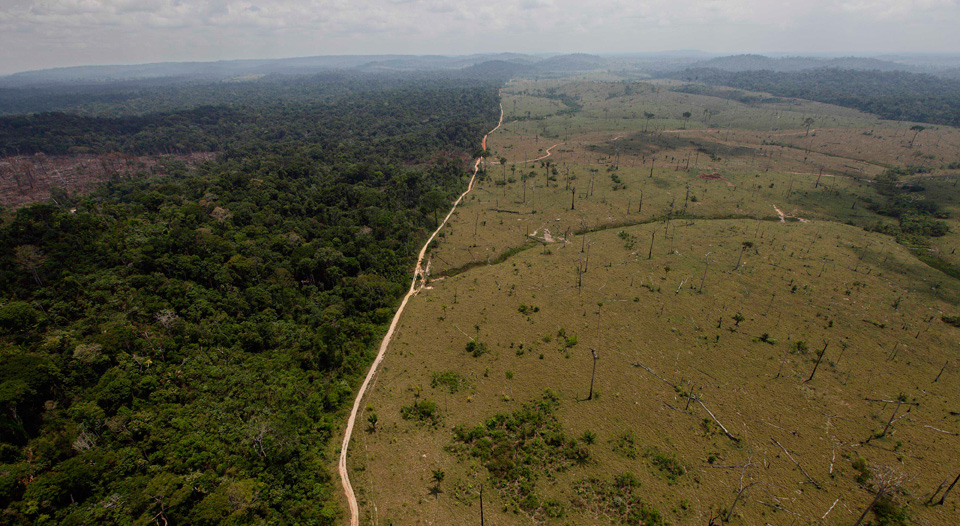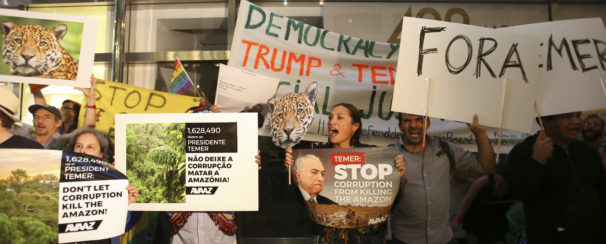
In Brazil, we have a national parliament that seems to be working at a double-quick speed for the disintegration of all civilized norms in the country, whether in labor legislation, social security, or other relevant spheres.
In May 2017, the Chamber of Deputies (the lower house of parliament) approved an amendment to the statutory limits of the Jamanxim National Forest in the southeastern state of Para. Shortly after this, the Senate voted on boundary changes to environmental preservation areas in both Para and Santa Catarina states.
Jamanxim, situated approximately a thousand miles from the state capital Belem, is a protected nature reserve and home to many native species of Amazonian plant life.
In 2006, former Brazilian president Luiz Inácio Lula da Silva demarcated the area by presidential decree. However, the forest has long faced predatory exploitation because of its proximity to the Cuiaba-Santarem road.
The forest frequently experiences agrarian conflicts due to illegal logging and mining activities by organized and violent gangs of land-grabbers and the non-enforcement of environmental regulations.
According to the preliminary data provided by the federal government environmental monitoring agency Prodes in 2016, 37.7 percent of its land area is already deforested.
According to the proposal approved by the Chamber of Deputies, a 3,067km tract of the national forest—24 percent of its total land surface—will be converted into an environmental protection area (EPA), a category in which the level of environmental protection is lower than that of a national forest.
In an EPA, forest land can be used for crop or livestock farming by settlers. However, national forest land can only be used in a sustainable way for scientific purposes or inhabited by families who have been living in the region prior to its creation.
The immediate purpose of this change in category was to enable the government to open this area up to a new grain railway, an export outlet for transporting the grains of the landlocked Mato Grosso state to the port of Miritituba in Para state.
However, the railroad required only 860 hectares of land. But the powerful agro-livestock lobby saw the need for building this export corridor as an opportunity for regularizing the illegal occupation of land by organized criminals for growing soybean and raising livestock, which is why the level of environmental protection was lowered over a much larger area.
According to the specialists, the changes proposed by the government and the parliament will have the effect of triggering more land-grabbing and deforestation in all the statutory conservation reserves across the country.
It is important to highlight that since last year, the rate of deforestation in Amazonia has risen by 29 percent over the previous year.
President Michel Temer, who had earlier promised to veto the project if passed by the parliament, has now backtracked on this under pressure from large land-owning lobbyists in Para state.
In July, he sent a proposal to parliament for a new law withdrawing a further 27 percent of protected land from Jamanxim.
As is well known, Brazil’s principal environmental problem is illegal and predatory deforestation. Logging companies are established in the region for cutting and selling trunks of protected trees and large landowners also set fire to Brazil’s forests to bring more land under cultivation.
This is the violence of capitalism. Multinational corporations and agribusinesses are working together with impunity. The government is providing encouragement and support to this process and is thus complicit in causing the pillage of the planet.

The new law proposed by Temer is ominous because it represents a step backward in the efforts of successive Brazilian governments, up to and including the presidency of Dilma Rousseff, to combat global warming.
According to a 2014 report by environmental charity WWF, “humanity is currently using Earth’s resources 50 percent faster than it can replenish… And what is even worse, the evidence suggests that we have only years, not decades, to restore balance before transforming the planet’s natural systems into irreversible cycles that will cause disasters in vast parts of nature and in the lives of billions of people around the world.”
The Canadian journalist, activist, and writer Naomi Klein’s latest book This Changes Everything—which I advise all those worried about the devastation to read—offers the correct prognosis.
The fundamental cause of this environmental crisis, she writes, is capitalism, characterized by an “extractive mentality,” which focuses on easy and immediate options without paying attention to the consequences.
The effects are systemic and the problem is that a large number of people do not believe that the phenomenon has already begun and that there is a need to fight it.
Brazil, a country privileged in terms of natural resources, could have been a role model to the world in the fight against global warming. But thanks to the policies of predatory capitalism pursued by its current president, it is fast becoming the role model for environmental disaster.












Comments